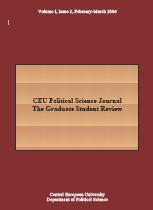The Transformation of Social Network Structure in Democratic Transition: Does It Influence Individual Political Behavior?
The Transformation of Social Network Structure in Democratic Transition: Does It Influence Individual Political Behavior?
Author(s): Oana Lavinia LupSubject(s): Politics / Political Sciences
Published by: Central European University (CEU) - Center for Policy Studies
Summary/Abstract: To date, many political science scholars have agreed that besides political institutions at least a minimum level of politically knowledgeable and active citizenry – or at least those behaving as knowledgeable - is needed for any democracy to work. However, more than five decades of empirical research have confirmed the picture of the average citizen as poorly informed and barely interested in politics, even in the Western established democracies. In the postcommunist societies of Central and East Europe, the delayed occurrence of an interested and participative citizenry has been seen as a major obstacle to their democratic transition. A glance at these countries indicates that despite the fact that now all of them have democratic constitutions and institutions, some have fared better than others in making democracy work.
Journal: CEU Political Science Journal
- Issue Year: 2006
- Issue No: 02
- Page Range: 30-47
- Page Count: 18
- Language: English

